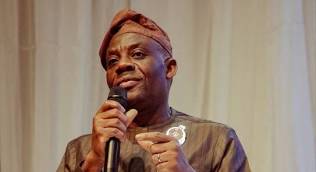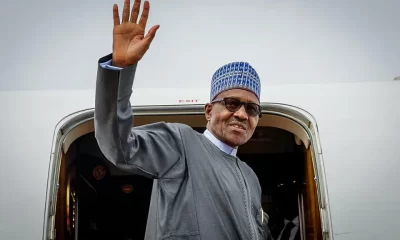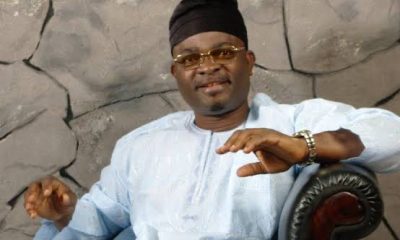NEWS
Review of Official Engagements of President Muhammadu Buhari and Vice-President Yemi Osinbajo, Last Week
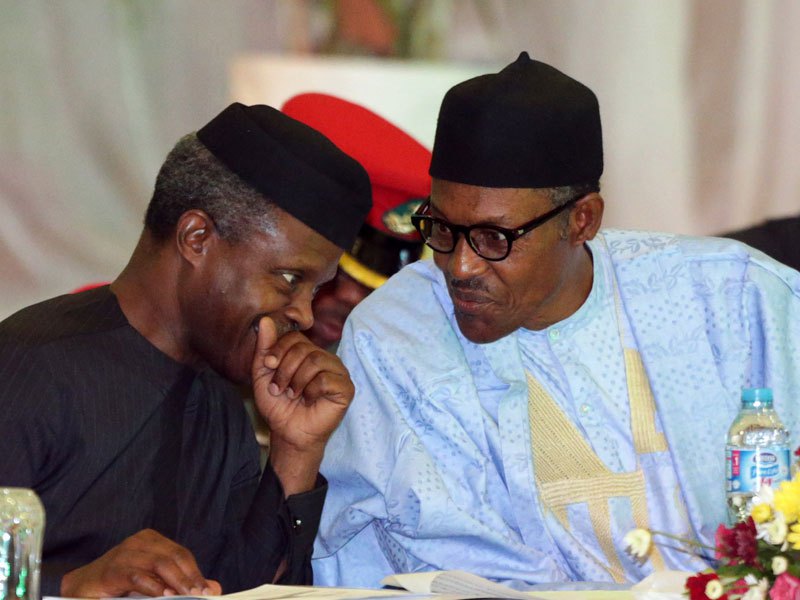
President Muhammadu Buhari commenced his weekly activities at the Presidential Villa, Abuja on Feb. 15 on a joyous mood after receiving the news of the election of former Minister of Finance and Economy, Dr Ngozi Okonjo-Iweala, as Director-General of the World Trade Organisation.
The president immediately issued a statement via his Special Assistant on Media and Publicity, Malam Garba Shehu, felicitating with Okonjo-Iweala, saying that by the development had brought joy and honour to Nigeria.
According to Buhari, the Harvard-educated economist takes up another onerous task of service to the world.
“Her track record of integrity, diligence and passion for development will continue to yield positive results and rewards to mankind.
Buhari affirmed that Okonjo-Iweala, who over the years had set major records of economic reforms in Nigeria as Minister of Finance and later Minister of Foreign Affairs, would excel in her new position.
He expressed his optimism that the former minister would validate the global mandate of repositioning and strengthening the multilateral institution for the greater good of all.
The president joined family, friends and colleagues in wishing Okonjo-Iweala well in her new endeavour.
The News Agency of Nigeria (NAN) reports that Okonjo-Iweala’s election follows months of deadlocked discussions among WTO members on who should be chosen as the next director-general of the world body.
The defunct Trump administration favoured South Korean Trade Minister Yoo Myung-hee.
However, after Joe Biden assumed the presidency, the South Korean minister decided to quit the race, paving the way for Okonjo-Iweala.
On Feb. 16, Buhari asked the Senate to confirm Mr Abdulrasheed Bawa as substantive Chairman of the Economic and Financial Crimes Commission (EFCC).
Mr Femi Adesina, the Special Adviser to the President on Media and Publicity, confirmed the development in a statement.
In a letter to the President of the Senate, Mr Ahmad Lawan, the president said he was acting in accordance with Paragraph 2(3) of Part1, CAP E1 of EFCC Act, 2004.
Bawa, 40, is a trained EFCC investigator with vast experience in investigation and prosecution of advanced fee fraud cases, official corruption, bank fraud, money laundering and other economic crimes.
He has undergone several specialised courses in different parts of the world and was one of the pioneer EFCC cadet officers in 2005.
Bawa holds a B.Sc. degree in Economics and Master’s degree in International Affairs and Diplomacy.
The EFCC Director of Operations, Muhammad Umar, has been acting as EFCC boss since suspension and subsequent removal of Ibrahim Magu by Buhari on July 7, 2020.
Also on Feb. 16, Buhari in a video goodwill message to the Ehingbeti Lagos Economic Summit, with theme: ‘‘For a Greater Lagos: Setting the Tone for the Next Decade’’, pledged that the Federal Government would support massive investments in Lagos State to boost its economic potential as one of the world’s fastest growing megacities.
According to him, his administration recognises Lagos as central to the economic fortunes of Nigeria and has in the last few years demonstrated commitment to supporting the unleashing of the full socio-economic potential of the state.
”One of the significant ways in which our support has manifested to Lagos State is in the special federal funding that we approved in 2020 in acknowledgement of the state being an epi-centre of the coronavirus pandemic.
”The challenges of Lagos must therefore, be very clearly seen as part of the challenges of Nigeria, and the Federal Government will support Lagos to overcome its challenges and to thrive socially and economically.
”The Presidential Infrastructure Development Fund (PIDF) is investing in the reconstruction of the Lagos-Ibadan Expressway, while the Apapa-Oshodi-Oworonshoki Expressway is a flagship project of our Road Infrastructure Tax Credit Scheme, also known as Executive Order 7 of 2019.
”It was also this administration which granted approval to the Lagos State Government to rebuild the International Airport Road, a major road that links the busiest airport in sub-Saharan Africa to the continent’s fifth largest economy.
”The Federal Government is today completing the Standard Gauge Railway Line that will link Lagos to Ibadan in the first instance and from there connect to Abuja and Kano and bring ease and efficiency to what is Nigeria’s busiest transportation corridor.
”Just last month, this new Rail Line achieved a milestone extension into the Port Complex in Apapa, setting the stage for a long overdue decongestion in that area,” he said.
On the investment plan to revamp the National Theatre, the president told the 8th Economic Summit that his
administration had granted approval for the temporary transfer of the iconic federal asset on the Lagos landscape to the Bankers Committee.
He said the committee would invest in upgrading the National Theatre and developing it into a world-class creative hub.
Later on Feb. 16, the president participated virtually in the induction /orientation for ambassadors-designate, consuls-general and charge d’ affaires entitre, held at the National Intelligence Agency (NIA) auditorium in Abuja.
At the event, the Nigerian leader urged the ambassadors-designate, consuls-general, charge d’ affaires entitre to continually project the strengths of Nigeria, showcase priorities of the government and uphold standards that will bring honour to the country.
He told the diplomats to always be mindful of the policy direction of the government, particularly the nine priorities it had listed.
“You must not forget that you have been posted to your respective bilateral and multilateral missions to represent and project Nigeria as a great and indivisible nation and a very attractive investment destination.
“In our effort to achieve realistic development oriented domestic and foreign policies, the government has identified nine priority areas to guide our policy directions and thrust within the time frame of 2019-2023.
“These are: building a thriving and sustainable economy; enhancing social inclusion and reducing poverty; enlarging agricultural output for food security and export as well as to attain energy sufficiency in power and petroleum products.
He named others as: expanding transport and other infrastructural development; expanding business opportunities, entrepreneurship and industrialization; expanding access to quality education, affordable healthcare and productivity of Nigerians.
The president also noted that the priorities include building a system to fight corruption, improve governance and creating social cohesion and improving security for all.
“I, therefore, urge all of you to be guided by these identified priority goals as well as your various Station Charters, which highlight specific mandates and guidelines on government’s expectation.
”We expect you to fight hard for Nigeria and for Nigerians abroad.
“You must strive to promote trade, human capacity development, foreign direct investment and other areas of cooperation with countries at national and multilateral levels to support our national growth and development.’’
Buhari also hosted a delegation of the Borno/Yobe Elders Forum, who paid him a courtesy call at the State House, Abuja on Tuesday, reiterating that the stability of the country is of paramount interest to him and that the Federal Government will continue to work towards it despite the actions of a few people.
“We need this country. We will continue to work for its stability.
”I feel that whatever happens, we will continue to make it and will keep on praying to God so that for those who feel that they don’t need Nigeria, we will succeed over their intentions and actions.”
The president attributed the upheavals in some parts of the country to a few people with resources and influence, assuring that they would be identified and dealt with in due course.
“I am confident that we will eventually convince the small number of people with resource and influence that are a nuisance to this great country.
”God willing, we will identify them and deal with them.
”I am extremely concerned about your constituency like the rest of the country,” he added.
The president noted the request for the upgrade and development of infrastructure in the states and assured that while he would do his best in acceding to the requests, he would, however, prioritise development in education.
“We are aware of the infrastructure deficit.
”Our priorities will be education because all our citizens know that children within a certain age must receive it otherwise, if they miss it, the future is destroyed,” he stated.
On Feb. 17, the president presided over the meeting of the Federal Executive Council (FEC), where cabinet members mourned the death of a former Lagos State Governor, Alhaji Lateef Jakande, with a minute silence.
Jakande served in the Federal Executive Council between November, 1993 and March, 1995 as Minister of Works and Housing.
Those in attendance at the council meeting include the Vice-President, Prof. Yemi Osinbajo, Chief of Staff to the President, Prof. Ibrahim Gambari and the National Security Adviser, retired Maj. – Gen. Babagana Monguno.
Others who also physically attended the meeting were six ministers and some senior aides to the president.
The ministers included those of Works and Housing, Babatunde Fashola; Women Affairs, Mrs Pauline Talen; Water Resources, Suleiman Adamu; Federal Capital Territory (FCT), Malam Mohammed Bello; Information and Culture, Alhaji Lai Mohammed as well as Finance, Budget and National Planning, Mrs Zainab Ahmed.
The Head of Service of the Federation, Dr Folasade Yemi-Esan, and other ministers joined the meeting online from their respective offices in Abuja.
The FCT Minister, Muhammed Bello, Works and Housing, Babatunde Fashola and that of Water Resources, Suleiman Adamu, later told State House correspondents that the council approved N103.671Bn for Works, FCT, Works and Housing as well as Water Resources ministries.
Bello said: “The Ministry of the FCT presented five memos at today’s meeting and all have to do with infrastructure; three within the FCT itself while two are in the area councils.
“Within the city, a contract was approved for the provision of an access road to the institutions and research district in Abuja, where we have the Nigerian War College, the Legislative and Judiciary Institute, among other public and private organisations at a contract sum of N3.4 billion.
“The second contract approved was for the construction of an access road and car park for the rail station, located at Kagini, a community just by Kubwa Expressway.
“The access road is to link the community to the expressway, so that commuters can use facilities of the station and the Abuja light rail into the city; and that contract was approved for the sum of N1.8 billion with a completion period of 12 months.
“The third approval was for an augmentation of N16 billion for the existing contract of the Southern parkway currently going on.
“The road stretches from the National Christian Centre, through the NTA, FCDA facility, crossing Muhammadu Buhari Way in Garki and bursting out at the ring road in Kaura District, with a duration of 24 months.”
The minister explained further that two area councils, Bwari and Gwagwalada, also had two roads approved for them.
Fashola also told the correspondents that council had approved more than N10. 2 billion for the completion of some road projects across the country.
According to Fashola, the benefitting states include Edo, Ogun, Plateau, Nasarawa, Benue and the FCT.
Adamu on his part, revealed that his ministry presented two contracts, which were also approved.
He said: “the first one is the Fika-Gadaka Water Project in Yobe. This project which started in 2003 was abandoned in 2007 at 30 per cent completion.
“We sought council’s approval to revive the project and therefore, we had to revise the cost of the project and also change the scope of work to include things like solar power, instead of the diesel generator provided for in 2003 when diesel was quite cheap.
“We have taken a policy in the ministry that going forward, we will be using solar system to power water schemes and accordingly, this was done in the case of this project plus an extension of the pipeline to cover more areas.
“Because between 2003 and now, obviously the two towns would have expanded. So this revised estimated total cost is in the sum of N555.15 million in favour of existing contractors Messrs Atlantic Full Drilling Services Company Ltd.
“Also the second memo is the revision of the consultancy contract for the supervision of Gere Earth Dam in Katsina State. This also is an inherited ongoing project. Council in 2018 approved the revised estimated total cost for the project.
“Council approved the extension of consultancy services of Messers Emplan Group by another 36 months also with augmentation of N310 million in terms of consultancy fees.”
On Wednesday, Feb. 17, Buhari met behind closed doors with Gov. Bello Matawalle of Zamfara, where he was briefed on the security situation in Zamfara State.
The governor, who later briefed State House correspondents after the meeting, said the president had pledged to assist the north-western state to address its lingering challenges.
He said that a presidential intervention toward addressing the challenges facing the state had become necessary “so as to sustain the peace Zamfara is now enjoying’’.
Later on Wednesday night, at his official residence, Buhari hosted Gov. Abubakar Bello of Niger, who after the meeting told State House correspondents that he updated the president on the security situation in his state, where some staff and students of Government Science Secondary School (GSSS), Kagara in the Rafi Council Area of the state were abducted by gunmen earlier Wednesday.
The president had earlier in a statement by his Senior Special Assistant on Media and Publicity, Malam Garba Shehu, condemned the abduction and dispatched a team of top security officials to the state to coordinate the rescue operation in the state.
Buhari also expressed sadness over the killing of one of the students by the kidnappers, vowing not to relent until normalcy is restored in the security situation of the country.
Bello thanked Buhari for swiftly ordering action on the GSSS Kagara school kidnap.
The governor said he had requested for more security personnel and equipment to fast-track results in the rescue operation in the state.
“I came in this evening to thank Mr President for his quick response to the plight of Nigerlites, following two serious kidnap incidents.
“At the same time we rubbed minds on what we think should be done so that we find an everlasting solution to the situation and Mr President has confirmed to me that this matter will be given proper attention.
“We’ll continue engaging the service chiefs so that we can guide and advise them on what we think should be done. So I think it was a wonderful meeting.’’
He also expressed support for the call by the nation’s Upper Chamber for the declaration of a state of emergency on security in the country.
On Feb. 18, Buhari received in audience the ECOWAS Head of Mission on the elections in Niger Republic and former Nigerian Vice-President, Alhaji Namadi Sambo.
The Nigerian leader at the meeting, said the out-going President Mahamadou Issoufou of Republic of Niger and his government deserved accolades for keeping scrupulously to their country’s Constitution with respect to run-off polls, scheduled for Feb. 21, 2021.
Buhari congratulated Sambo on the first round of the elections, which produced no clear winner, thus compelling a run-off set for Feb. 21, as prescribed by the Constitution of the country.
While noting that Niger was Nigeria’s close neighbour, the president said the peace of the country must matter to Nigeria.
“Neigbourliness, whether national or individual, is very important as the peace of your neighbour or lack of it, may also affect your own well-being,” he added.
He wished Republic of Niger, Sambo and his team best of luck as the run-off polls hold on Sunday.
Also on Thursday, Feb. 18, the Yemi Osinbajo, presided over the first physical meeting of the National Economic Council (NEC), since the outbreak of the COVID-19 pandemic in the country.
The meeting, attended by 36 governors (or their representatives) deliberated on national issues, including current security challenges in some parts of the country.
The meeting resolved that henceforth, concerted efforts would be made towards immediate investigation, arrest and prosecution of all perpetrators of crimes in the country, while both the states and the Federal Government should ensure full protection of all Nigerians wherever they reside, without regard to ethnic, religious or regional status.
According to the resolution of the council, both the Federal and State Governments should re-commit to “the protection of all residents of all states, including non-indigenous communities, religious and ethnic minorities within states’ jurisdictions.”
Similarly, it was resolved that in collaboration with federal authorities, there should be the commencement of “the reconstruction of destroyed homes and payment of compensation where appropriate by state authorities for damages to property and livelihoods sustained during targeted attacks on communities within their jurisdictions.”
Buhari concluded the week’s official engagements with closed-door meetings with Gov. Dapo Abiodun and the Executive Director/CEO of the Nigerian Export Promotion Council (NEPC), Mr. Segun Awolowo, at the Presidential Villa, Abuja.
Abiodun, who briefed State House correspondents after the meeting with the president, disclosed that he updated Buhari on the security as well as socio-economic developments before and after the recent crisis in Ogun State.
Crisis broke out in Ogun State recently, following ethnic profiling of a section of the society, occasioned by social discontent.
The governor blamed foreign elements as those responsible for the reported attacks on herdsmen in the state.
The governor, who briefed State House correspondents after his closed-door meeting with the President, blamed foreign elements as those responsible for the reported attacks on herdsmen in the State.
“I came to see Mr President to give him first-hand detailed account of the circumstances surrounding the crisis you all have read about that we witnessed in Ogun State in the past few weeks.
“I thought it was important, as the president and commander-in-chief, that he should hear from me, his governor on what exactly is the true account of what happened in Ogun State.
“I can share that with you, although, I’m sure most of you are aware of what happened.”
The governor, who narrated how intruders came in from Cameroun and other locations to cause problems in his state, said he immediately summoned a stakeholders meeting to address the problems.
Awolowo on his part, after the meeting with Buhari on Friday, assured that given the steps being taken to improve non-oil exports, Nigeria would exit its dependence on crude oil revenue in 10 years.
He expressed optimism that in the next decade, Nigeria could get 30 billion from non-oil export notwithstanding the effect of the current COVID-19 pandemic on the nation’s economy.
The NEPC boss noted with delight Nigeria’s swift recovery from recession in the fourth quarter of 2020 and congratulated the president for his efforts.
“In a now less predictable, less reliable and less generous world, he has definitely demonstrated with his leadership that we are able to build a resilient economy that can absorb all global shocks, whatever they may be, known and unknown,” Awolowo stated. (NAN)
NEWS
The Man Rotimi Makinde: A True Progressive by All Standards
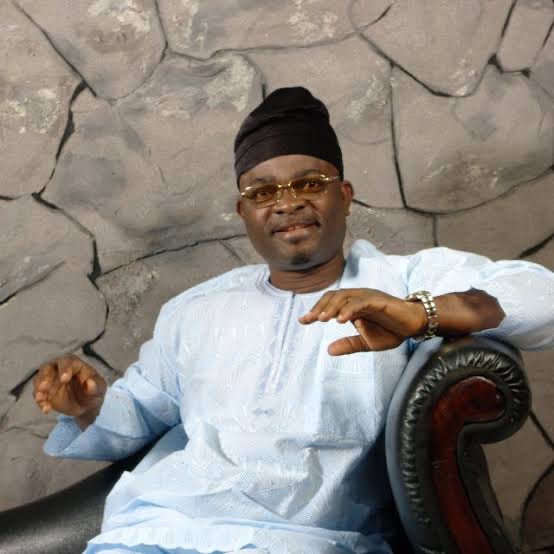
By Kolapo Ogundare
It is impressive to note that many well-meaning Nigerians are now coming out, recounting several good deeds and socio-economic empowerment programmes which Hon. Rotimi Makinde embarked on when he held sway as the representative of Ife Federal Constituency at the House of Representatives in Abuja.
There are several accounts of how the veteran actor and politician touched many lives through scholarships to brilliant but indigent students, and financial support to small and medium scale business owners.
Provision of barbering kits to barbers, and hairdressing equipment to hair dressers in large numbers; provision of buses, tricycles, motorcycles and cars to several vulnerable segments of the society etc.Notable among his midas touch even as a Muslim was the building of a church to replace the old church of popular pastor, Akinola, who was assassinated on the eve of 2011 elections, which Makinde eventually won.
Records show that the church was built in the late pastor’s memory to compensate the church leaders, the surviving widow of the church founder and other innocent people who lost their lives to the cold hands of death by men of the underworld.
In addition to this church building was a two-bedroom flat for the widow, prophetess Akinola.
The church cost over N10 million (as it then) was officially inaugurated on October 27, 2014. Makinde’s act of giving back to his community is a testament to his commitment to serving and uplifting his constituents.
Reminiscing on this significant milestone, Prophet Elijah Makufota said:
“Only a liberal Muslim by faith can build a church. Today we celebrate a remarkable philanthropist Hon Rotimi Makinde whose generosity knows no borders—bridging mosques and chapels, uniting hearts across faiths. His vision reminds us that love, compassion, and service are the truest expressions of any religion. A rise La ri ka “.
Fairness, kindness, and justice are the true compasses of a good heart—not the label of a creed. When we measure a person by the content of their character rather than the doctrine they profess, we strip away the divisions that religion often erects and focus on the common thread that binds us: our shared humanity.
In a world where every individual is judged by how they treat others, by the equity they extend in everyday interactions, and by the integrity they show when no one is watching, we create a society that thrives on cooperation rather than conflict. Let us therefore place our emphasis on the principles that unite us—fairness, compassion, and justice—and allow those values, not religious affiliation, to be the true yardstick of a person’s worth.
“A kind act is a universal prayer; a fair decision, a lasting testament. Let us be judged by the deeds we do, not the faith we claim. Rotimi Makinde remains a shining light in our body politic and surely posterity will be kind to him.
A leader with quality and distinction is characterized by their ability to inspire, guide, and support a team. They are self-aware, communicate effectively, delegate work, and encourage strategic thinking. These qualities are essential for leading with confidence and fostering a productive, motivated team. That is who Rotimi Makinde is, this true blood of Ile-Ife undoubtedly has a date with destiny and will surely be marked out for positive trajectory in our political landscape.
All our political stakeholders and decision makers must take note of this political icon, a loyal party man, he is ever patriotic and with great uncompromising spirit, he is one individual who on several occasions sacrificed his convenience in the best interest of his party All Progressives Congress (APC) and Osun State particularly.
Makinde has consistently demonstrated resilience, a strong work ethic and an unwavering commitment to excellence in the execution of any assignment given to him with high moral rectitude. I wish him best of luck in his political journey. May God bless Osun State, bless our leader and mentor, President Bola Ahmed Tinubu GCFR and also bless our dear country, Nigeria.
Kolapo Ogundare writes from Ede, Osun State.
ReplyForward
Add reaction
NEWS
FG, NBS Launch Nationwide MICS7 Survey
From Francis Sadhere, Delta
The Federal Government of Nigeria, through the National Bureau of Statistics (NBS), has officially launched the Multiple Indicator Cluster Survey Round Seven (MICS7), a nationwide household survey supported by the United Nations Children’s Fund (UNICEF).
MICS7 is the seventh round of the globally recognised Multiple Indicator Cluster Survey programme and is aimed at generating critical data on the well-being, health, education and living conditions of women and children across Nigeria.
The survey is expected to provide reliable statistics to support evidence-based policymaking and enable effective tracking of Nigeria’s progress toward achieving the Sustainable Development Goals (SDGs).
The survey covers key thematic areas such as education, health, nutrition, immunisation, water, sanitation and hygiene (WASH), and child protection. It also introduces new data collection modalities to capture emerging development indicators.
Trained enumerators are currently visiting selected households across the country, using digital data collection tools to ensure accuracy, efficiency and real-time validation of responses.
One of the major innovations of MICS7 is the introduction of anthropometric measurements for children under the age of five, which will provide more precise data on child growth, nutritional status and overall health.
The survey also features a new learning foundation component designed to capture school-related data, alongside expanded indicators that were not included in previous survey rounds.
Speaking on the exercise, the National Coordinator of MICS7 at the NBS, Dr. Isiaka Olarewaju, said the survey would track up to 40 internationally comparable indicators, making it one of the most comprehensive household data collection exercises in Nigeria.
He stressed that the success of the survey largely depends on the cooperation of selected households and urged Nigerians to welcome enumerators and provide accurate information.
MICS7 is being implemented through a collaborative partnership involving the NBS, UNICEF and state governments across the federation. The partnership, according to stakeholders, reflects a shared commitment to advancing national development through the generation of reliable and actionable data, particularly for children, women and households.
In Delta State, the Director of Statistics, Nkechi Maduemezia, has appealed to residents of selected households to fully cooperate with interviewers to ensure the success of the survey in the state.
She noted that accurate participation would contribute to improved planning, better service delivery and stronger development outcomes for both the state and the country.
The nationwide data collection exercise is expected to last about six months, after which the findings will be analysed and disseminated to inform national and state development policies, human capital development strategies and child-focused interventions.
NEWS
Finding Joy in Old Age: The Renewed Hope Intervention
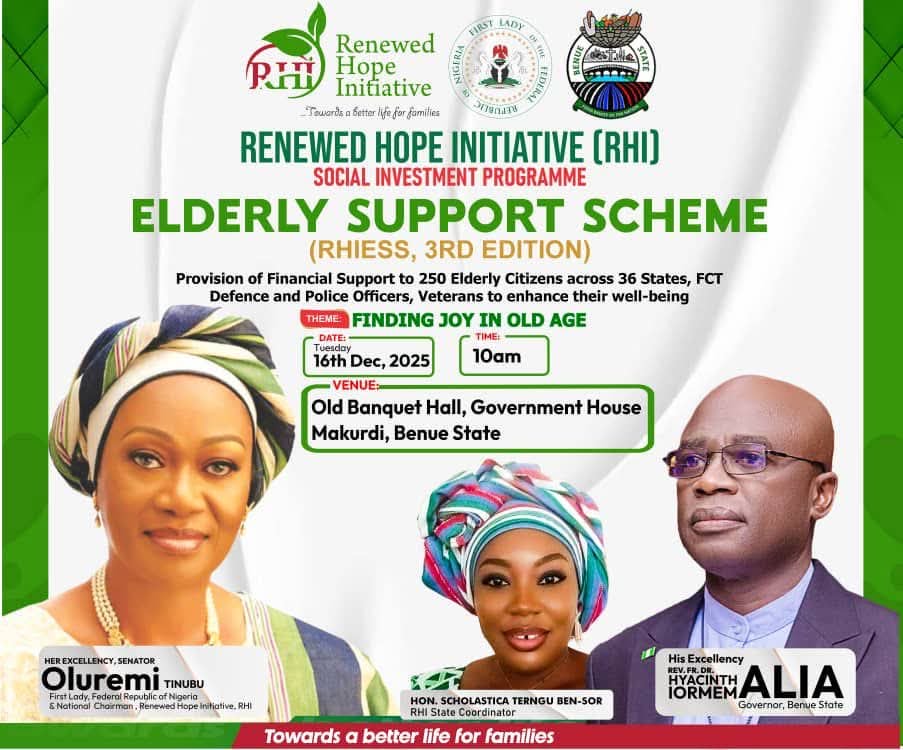
By Bridget Tikyaa
Getting to the life journey of a senior citizen should ordinarily be a source of pride, a stage of celebration in life, less hassles, basic comfort, and time to savour the fruits of one’s labour. However, the reality is that things don’t turn out to be this way in most climes.
Just like in other parts of the world, in Nigeria, the elderly population are facing numerous challenges ranging from difficulties in accessing affordable, specialized healthcare services to address age-related health issues, irregular pensions and financial support to ensure decent living, improper access to basic amenities like housing, sanitation, and nutrition, emotional support, and many others.These are essentials that can significantly improve the quality of life for elderly individuals. The difficulties in accessing them highlight the need for improved social support systems, healthcare infrastructure, and policies to protect the rights and dignity of elderly individuals in Nigeria.
However, amidst these challenges, an organisation committed to better welfare for Nigerians has significantly focused on rendering vital support to vulnerable elderly Nigerians, giving them hope, comfort, and a new lease of life. This is the Renewed Hope Initiative (RHI), through its Elderly Support Scheme.
The Renewed Hope Initiative is the flagship programme of Nigeria’s First Lady Oluremi Tinubu, focusing on women, youth, children, and the elderly. The RHI is where every Nigerian’s dream of a better life is reached and has been creating real, lasting change by focusing on families, dignity, and opportunities.
Since 2023, the Renewed Hope Initiative has consistently celebrated elderly citizens every December as a mark of appreciation for their sacrifices. On Tuesday, December 16, 2025, the RHI held the third edition of such intervention – the Elderly Support Scheme – in Benue State at the Old Banquet Hall, Government House, Makurdi, with the theme “Finding Joy in Old Age”.
It is not just an RHI agenda but part of the Nigerian government broader social investment efforts aimed at promoting the dignity, comfort, and well-being of elderly Nigerians.
During the third edition of the Elderly Support Scheme, 250 vulnerable elderly citizens aged 65 years and above were supported by the RHI in Benue State. Significantly, the same number of elderly citizens in all the states of the Federation and the Federal Capital Territory received similar support.
Each beneficiary received N200,000 during the ceremony in Makurdi, while Governor Hyacinth Iormem Alia gave each beneficiary a bag of rice. There was also a free medical outreach for the elderly, during which beneficiaries received basic health checks, consultations and medical support, underscoring the holistic approach of the initiative to both financial and health needs of senior citizens.
Benue State Coordinator of the Renewed Hope Initiative, Hon. Scholastica Ben-Sor said the initiative, a pet project of Nigeria’s First Lady Remi Tinubu, reflects a resolute determination to honour senior citizens who have contributed immensely to nation-building.
She noted that since 2023, the Renewed Hope Initiative has consistently celebrated elderly citizens every December as a mark of appreciation for their sacrifices, with a total of 9,500 beneficiaries nationwide each receiving ₦200,000, totalling N1.9 billion.
“As we approach the festive season, it is our moral duty and indeed our joy to ensure that our elderly live their twilight years in comfort, good health and dignity,” the First Lady said in the message to the event.
The purpose is to make the senior citizens remain active, find purpose in community life, and embrace joy in old age.
For Hon. Scholastica Ben-Sor, valuing elderly citizens is absolutely necessary. “What you are today is not forever. Life may take you through certain curves you don’t know. The least person you see today may be the person you will look up to tomorrow,” she said, calling on society to treat the elderly with dignity, respect, and compassion.
She hailed all those impacting lives including Governor Hyacinth Iormem Alia, whom she described as a man of integrity, sacrifice and uncommon commitment to service, who has positively impacted families, homes and society at large, stressing that family, church and school form the bedrock of any society.
Although the governor did not attend the event, Hon. Ben-Sor disclosed that he directed that each of the 250 beneficiaries receive a bag of rice through the State Emergency Management Agency (SEMA), in addition to facilitating the free medical outreach conducted for the elderly during the programme.
Goodwill messages were delivered by several dignitaries, including a representative of the wife of the Deputy Governor of Benue State, Hon. Mrs. Christy Ode, who praised the First Lady for sustaining the initiative and applauded Governor Alia for his visible developmental strides across the state while the Commissioner for Women Affairs and Social Development, Mrs Teresa Odachi Ikwe, represented by the Director of Finance and Accounts, Hon. Ifa Celestine commended the transparency of the RHI and advised beneficiaries to use the funds judiciously to improve their standard of living. Similarly, the Benue State Women Leader of the All Progressives Congress, Hon. Mrs. Helen Agaigbe appreciated the First Lady for her remarkable traits of compassion displayed through consistent support for the vulnerable in the society.


